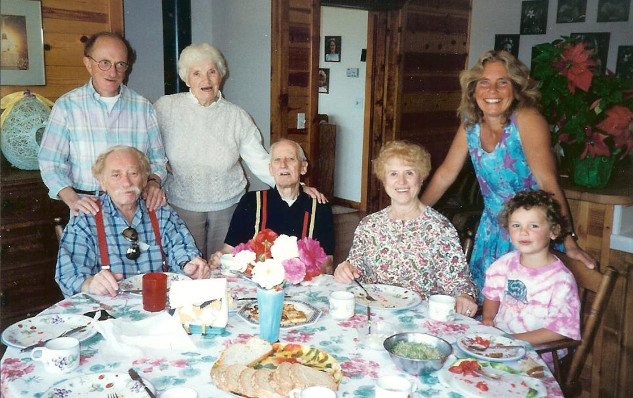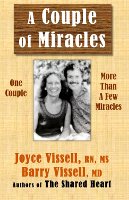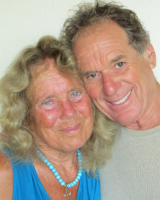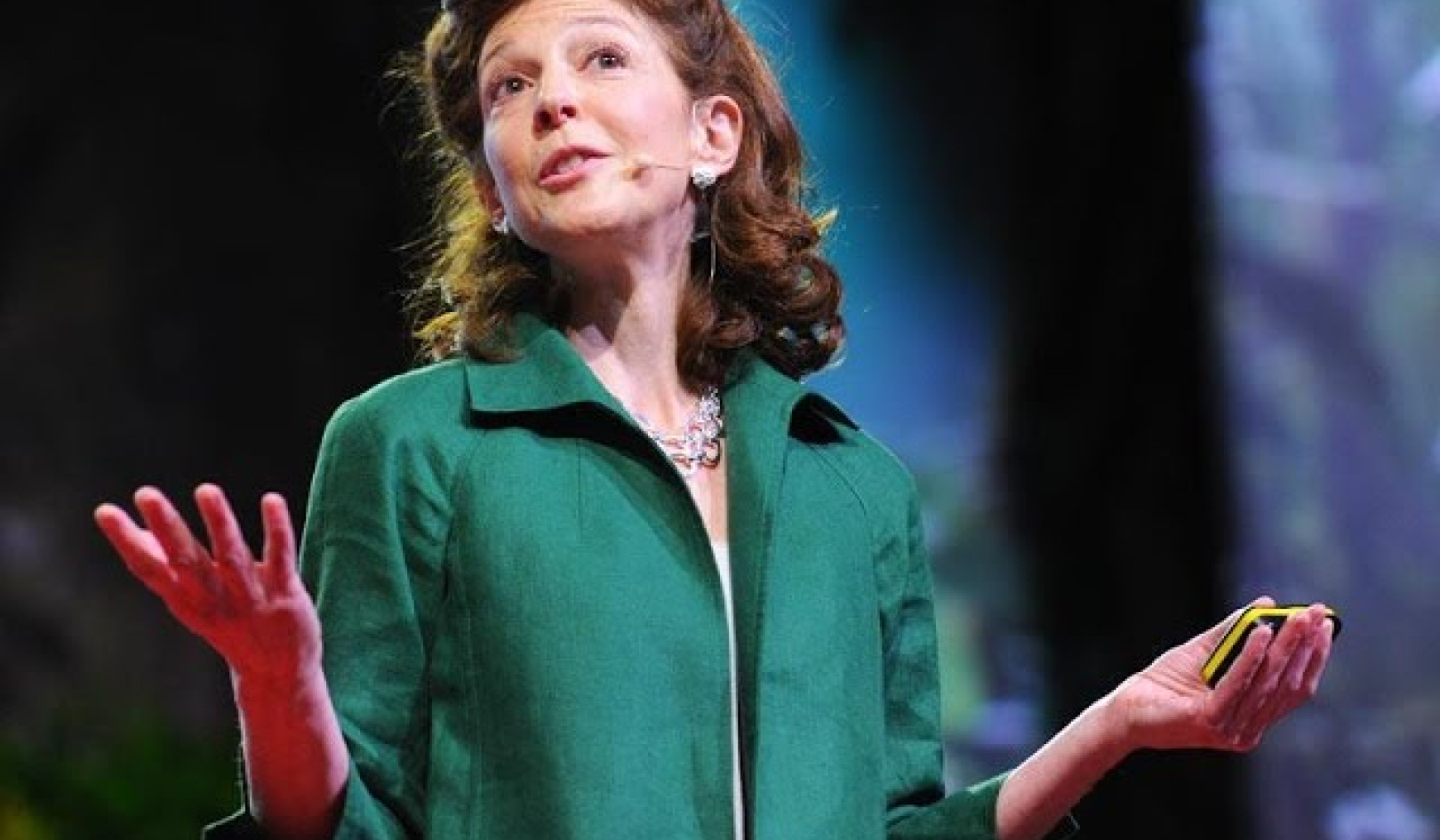
Standing from left: Barry's uncle Ralph; Joyce's mom Louise; Joyce. Sitting from left: Barry's dad Michael; Joyce's dad Hank; Barry's mom Helen; our son John-Nuriel
In This Article:
- How do families differ in expressing emotions?
- What impact do these differences have on individual family members?
- How can one navigate contrasting emotional expressions within a family?
Expressing Emotions Differently in Family Dynamics
by Joyce Vissell.
The following is excerpted from the Vissell's new book, A Couple of Miracles: One Couple, More than a Few Miracles.
In my family (Joyce), when someone talked, everyone else listened. There was respectful interest in whatever topic someone brought up. No family is perfect, however. My family had trouble accepting my sensitivity. In addition, feelings in general were not acceptable. When my parents were upset with each other, there was an icy silence at the dinner table. It was painful for me to feel their invisible anger.
Barry, on the other hand, came from a loud Brooklyn Jewish family. When I first visited his family at age eighteen, I was shocked to observe that everyone talked at the same time. It was like stepping into the movie, My Big Fat Greek Wedding. It seemed to me that no one was listening to anyone.
If someone really wanted to be heard during a meal, they simply spoke louder than everyone else. But that rarely worked, for eventually, it seemed to me that everyone was speaking in loud voices, almost shouting. I felt intimidated. I felt like hiding in a closet. Barry seemed to not notice any of this and just sat quietly eating his meal. This was "normal" to him.
Expressing Emotions in Different Ways
In my family, the emotions were hidden. In Barry's family, it felt like they were over-expressed. There was a lot of yelling. Barry apparently coped mostly by withdrawing like a turtle into his shell.
When I first met Barry's father, Michael, he didn't ask me the traditional questions like, "Where does your family live? What is your major in college? Do you have brothers or sisters?" Instead, he came down the stairs, shook my hand and asked, "Do you know how to make tuna salad?"
I said, "Yes. My mother was a good cook and taught me from the time I was quite young."
He pressed, "Please tell me how you make tuna salad."
I felt embarrassed, put on the spot by someone I had just met, but still wanted to impress.
"Well, I mix the tuna with mayonnaise, and maybe add a little salt and pepper..."
I wasn't finished, but he waved his hand dismissively and smiled, "You don't know how to make tuna salad." He then proceeded in the next half hour to explain how he made tuna salad, even demonstrating with an imaginary knife the special way he chopped up the celery, an important ingredient that I "forgot."
That was my first contact and conversation with Barry's dad, and I have never forgotten it. His love for food seemed strange to me at first. His eccentricities were sometimes over the top, but I grew to love these qualities about him.
He truly didn't care what people thought about him, a quality that had its positive and negative sides. Barry seems to have inherited this particular quality, and is one of the things I admire about him, unless it embarrasses me.
Communicating in Different Ways
One of Michael's favorite things to do was go to the grocery store each morning. He would wake up with a list in his head. Often, while waiting in line to pay for his groceries, he would look into the shopping carts on both sides of him. Once, he noticed asparagus in a woman's cart, and said to her, "Excuse me, but what are you planning to do with that asparagus?"
She seemed at first surprised by his inquisitiveness, but finally said, "I'll probably just steam them."
Again, the dismissive wave of his hand, and then, "No, not good enough! Here's what you should do with the asparagus." And he'd tell her, in detail, even though it was obvious that she would rather be anywhere but here in line with this strange man.
With Barry's dad, the main subject of conversation during a meal was the next meal! Not only was he overweight, but he had chronic angina pain and hypertension. Barry's mother constantly admonished him about his over-eating. Consequently, he often saw people through the filter of weight. If a particular person was brought up in conversation, his typical comment was one of two choices, "He or she has gained," or "He or she has lost." When Barry and I would visit their home, he'd appraise each one of us, and announce, "You've lost" or "You've gained."
Different Ways and Traditions
Besides his dad's preoccupation with food itself, the kinds of foods were also strange to me. I'll never forget my horror when we sat down to lunch during that same first visit, and yes, there was tuna salad on the table. I watched Barry's dad take a piece of gefilte fish from a jar on the table and slide it into his mouth. With a glint in his eye, he next lifted the jar to his lips and drank the slimy gel. "Ahhh," he said, putting down the jar, with the gel still clinging to his mustache, "That's the best part of all." He offered a piece to me, which I politely refused.
Barry's mom had been a first-grade teacher for twenty years when I first met her. She loved children very much, but she sometimes treated her grown children as part of her first grade. The first meal I had at their house, I was politely told, with a voice that sounded like it was addressing six-year-olds, that I must wash my hands first and not to forget to use soap and scrub carefully until they were "squeaky clean." Though surprising at first, this quality became endearing to me.
Expressing Love in Different Ways
Both Barry and I came from loving families. But as you can see, they were different, as well as having their own share of dysfunction. It was shocking for Barry to sit at our family table and realize that, when he spoke, everyone else would listen to him. He wondered if he were on a different planet.
Even from the early age of eighteen, Barry knew that part of loving me was also loving my family. He couldn't change how they were, so he found a way to fit in, just as I needed to do with his family. I never did learn how to make tuna salad as precisely as Barry's dad. We eventually became vegetarians. No, not because of the experience with Barry's dad.
* Subtitles by InnerSelf
Copyright 2023. All rights reserved.
Article Source: A Couple of Miracles
A Couple of Miracles: One Couple, More Than a Few Miracles
by Barry and Joyce Vissell.
 We write our story, not only to entertain you, our readers, and certainly you will be entertained, but more so to inspire you. One thing we have learned after seventy-five years in these bodies, living on this earth, is that all of us have lives filled with miracles.
We write our story, not only to entertain you, our readers, and certainly you will be entertained, but more so to inspire you. One thing we have learned after seventy-five years in these bodies, living on this earth, is that all of us have lives filled with miracles.
We sincerely hope you will look at your own lives with new eyes, and discover the miraculous in so many of your own stories. Like Einstein said, “There are two ways to live your life. One is as though nothing is a miracle. The other is as though everything is a miracle.”
Click here for more info and/or to order this book. Also available as a Kindle edition.
About the Author(s)
 Joyce & Barry Vissell, a nurse/therapist and psychiatrist couple since 1964, are counselors, near Santa Cruz CA, who are passionate about conscious relationship and personal-spiritual growth. They are the authors of 10 books, their latest being A Couple of Miracles: One Couple, More Than a Few Miracles.
Joyce & Barry Vissell, a nurse/therapist and psychiatrist couple since 1964, are counselors, near Santa Cruz CA, who are passionate about conscious relationship and personal-spiritual growth. They are the authors of 10 books, their latest being A Couple of Miracles: One Couple, More Than a Few Miracles.
Visit their website at SharedHeart.org for their free weekly 10–15-minute inspirational videos, inspiring past articles on many topics about relationship and living from the heart, or to book a counseling session on-line or in person.
Article Recap:
The article examines the varied ways families express emotions, contrasting a family that hides emotions with one that openly communicates them. It discusses the challenges and learning opportunities arising from these differing styles, emphasizing the importance of understanding and adapting to various emotional expressions within family dynamics. The piece underscores the necessity of acknowledging and respecting different communication traditions to foster healthier relationships.































